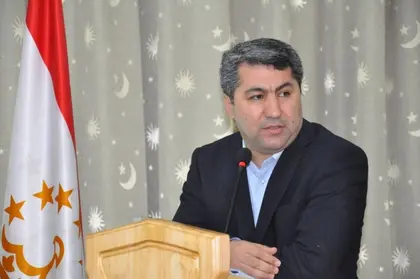Residents of Russia’s Central Asia territory, and specifically Tajiks, who hail from neighbouring Tajikistan, have been recruited at rates far higher than ethnic Russians for Putin’s war in Ukraine. Kyiv Post sat down with Muhiddin Kabiri, the de facto leader of the Tajik democratic opposition, to discuss how he’s been leading the fight to keep his fellow countrymen out of the ranks of the Russian army.
Tell me about the work you do to help Tajiks in Russia avoid mobilization.
JOIN US ON TELEGRAM
Follow our coverage of the war on the @Kyivpost_official.
We do active work among Tajiks, explaining why they should not participate in the war against Ukraine and how to avoid mobilization. It works. Many have managed to avoid mobilization and stay inside Russia itself. It is too early to talk about resistance on the part of the individual diaspora, although the Tajiks have proven that they can resist with dignity and defend their values. Resistance must not have any national or religious connotations, it must involve all peoples of Russia.
There is evidence that Tajiks and other Central Asians are being harassed or beaten because they are Muslims in the Russian army, especially after the shooting of Tajiks at a Russian military training center earlier this month. What happens next?
Russia itself has already realized that Islamophobia is weakening the already demoralized Russian army. Imams, influential Muslims and opinion leaders are being “mobilized ideologically” to carry out propaganda work among Muslims, especially migrants. Working groups have been created, which include our acquaintances. Their task is to justify actions carried out by Russia in Ukraine in the eyes of Muslims, and to make this war “sacred” for Muslims in terms of Islam. Special attention is given to Tajiks and this is natural after the shooting in the training center.

Drone Wars –Technology, Tactics, Strategy, Countermeasures, Legislation
What is your own role in Tajik politics?
It’s hard for me to say anything about my role in Tajik politics. Experts and, or voters, could talk about this if there was a transparent electoral system in place. I represent a generation of politicians who were formed in the latter years of the Soviet Union, who witnessed or participated in its collapse, participated in the formation of independent nation states and now fight against the dictatorship of these same states.
Specifically?
To be more specific. I lived through civil war in Tajikistan, took part in the peace process, was member of National Reconciliation Commission, and in 2005 was elected to Parliament as a lawmaker (till 2015), In 2006 I headed the biggest opposition parliamentary party, PIVT (Islamic Renaissance Party of Tajikistan). The party was banned in 2015, and I left the country and have been fighting politically from abroad ever since.
Russia’s mobilization of so many ethnic Tajiks is rumored to have caused greater instability in Tajikistan. What do you think?
Tajikistan cannot be a stable country for many reasons: The weakest economy in the region, which is also based on money sent back by migrants, one of the most totalitarian regimes in the world, a high level of corruption and nepotism, proximity to Afghanistan, etc. Today’s Tajikistan is a well-canned powder keg that can explode at any moment.
How many Tajiks are there in Russia?
According to various data, over 40 million people in the world identify themselves as Tajiks. About 8 million live in Tajikistan (which has a total population of 10 million). There are more Tajiks in Afghanistan than in Tajikistan itself. In recent years, many Tajiks have received Russian citizenship; around 410 people a day.
Are people living in Tajikistan worried that their friends and relatives living in Russia will be taken to war? Do you think they will start speaking out against their government?
Many people are concerned, but that’s not yet a reason to oppose the government. Tajiks are not used to holding protests, making demands or criticizing the authorities. This is very dangerous. That is why people migrate. This is also a protest. Those who are tired of migration succumb to radicalism. So, there are a lot of Tajiks who are members of ISIS, the Taliban and other armed groups. Migration to Russia has reduced social tensions in society. Now the situation is changing, and that’s why I call the country a powder keg. People may not come out to protest over any particular issue, but any spark can be a catalyst for conflict or revolution.
How close are the governments of Tajikistan and Russia?
Very close. Tajik leader Emomali Rahmon and Russian President Vladimir Putin can criticize or complain about each other, as Rahmon did in Astana recently [at the Central Asia– Russia Summit], but they are very close in spirit, mentality and worldview. Most importantly, they equally and pathologically hate everything about democracy and liberalism.
How do people in Tajikistan feel about the war in Russia?
If you had asked me this question before the mobilization, my answer would have been unambiguous: the majority of Tajiks think Russia’s actions are right. Because there is no alternative to the propaganda from the Russian and Tajik authorities. The situation is changing now. Mobilization has moved the war from Ukraine to Russia, and even to Tajikistan. Now everyone feels the results of the war on themselves. Russians and Tajiks who fled the mobilization have provided alternative opinions and views. People are asking whether the war on the Russian side is right, and why are the Russians themselves fleeing? And the doubts grow with every single day.
You can also highlight the text and press Ctrl + Enter







